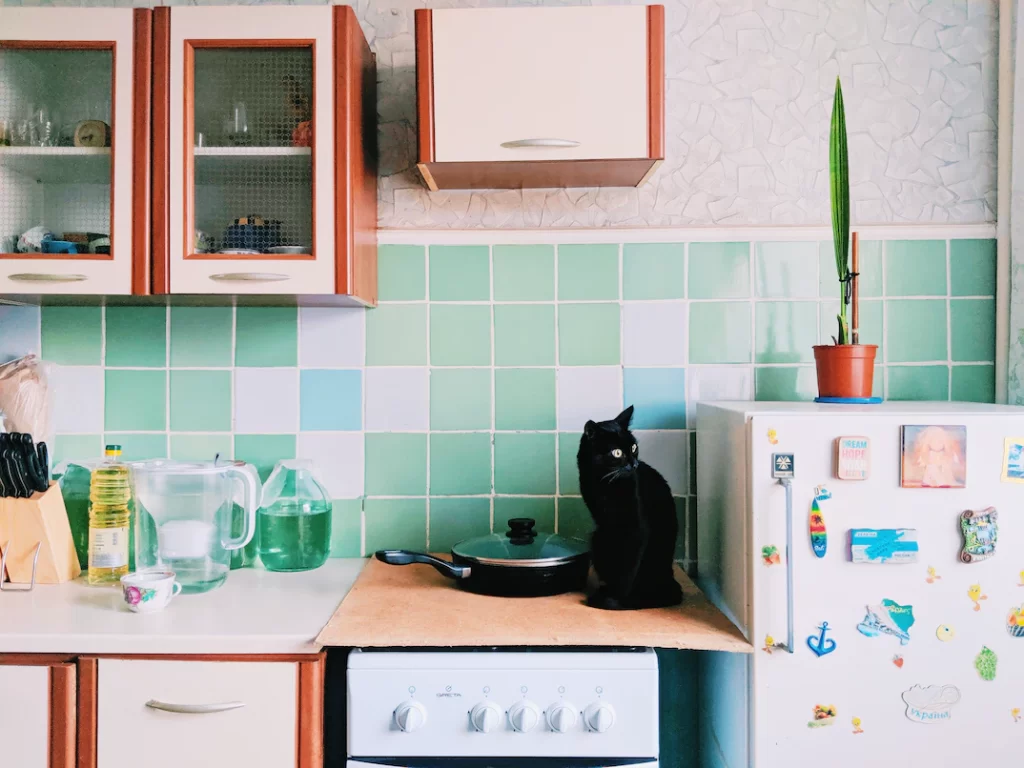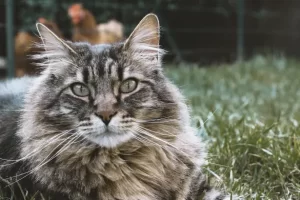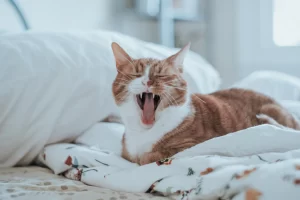Last updated on January 16th, 2023 at 03:44 am

Noodles and pasta are popular foods around the world, so it’s only natural to assume that your cat shares this passion. People who have pets often ask if their feline friends may safely partake in the human noodle binge. So, can cats eat noodles?
To answer your question, yes, cats can eat noodles. However, it doesn’t really give any nutritional benefits to your cat. So, let’s go into the materials used to make noodles, whether or not they’re good for your pet, and which kinds of noodles should be avoided.
Are Noodles Safe For Cats? Is There Any Risk?
Even though cats can eat noodles, that doesn’t mean they should. To figure out if the noodles are safe for your cat, you should look at what goes into making noodles. The main ingredients in noodles are flour, eggs, and water. But salt is the one main ingredient that is always used to make noodles. Most noodles are bad because they have a lot of sodium in them. It is not a good idea to give a cat a lot of noodles because it can cause sodium ion poisoning. You should also know what kind of food a cat needs to eat. Since cats eat meat, their food shouldn’t have too many carbohydrates.
You should also be aware of two major risks concerning plain, cooked noodle. The first step before you let your cat eat noodles is to ensure that your cat does not have a gluten allergy. Some signs of a gluten allergy include weight loss, recurrent diarrhea, asthma, itchy/dry skin, and vomiting. However, the best approach to find out if your cat is gluten intolerant is to take them to their veterinarian and have them tested.
If your cat is free of allergies, the next issue to address is weight gain. Since noodles have a lot of carbohydrates, giving them to a cat too much can make it fat. Just like in humans, obesity is a serious problem that also affects cats. Too many carbs in a cat’s diet can also cause metabolic diseases and high blood pressure. But, as an occasional snack, boiled noodles present no threat to your fur baby. At the same time, it’s true that noodles on their own don’t give your pet much or any nutrition.
Again, if you have any worries about giving your cat a little quantity of pasta, please contact your veterinarian because every cat has distinct dietary needs.
Are All Types of Noodles Okay for Cats to Eat?
Cats shouldn’t consume some type of noodles. Monosodium glutamate, or MSG, can hurt cats. This is especially true of noodles made with teriyaki or lobster sauce. Most of the time, these kinds of noodles have preservatives and flavorings that make cats throw up and have diarrhea.
What kind of noodles can a cat eat?
Here are some of the noodles types that you can safely give your cat.
- Rice Noodles
Rice Noodles are made from rice flour and water, along with tapioca or cornstarch. Rice is the most easily digestible grain for any animal, including your kitty companion. Because it is so gentle on the digestive tract, most veterinarians will recommend feeding your cat a diet consisting primarily of boiling rice if he or she has digestion or digestive tract issues.
Moreover, some felines have gluten intolerances. However, because rice noodles are gluten-free, you don’t have to worry about your pets getting stomach upset after eating their favorite food. If your pet has celiac disease, he or she will appreciate a bowl of cooked rice noodles rather than wheat flour noodles, especially if your pet is a cat.
- Quinoa Noodles
Yes, some noodles are made with quinoa flour. And these noodles are the healthiest kind of noodles you can give your pet. You see, quinoa contains protein, fiber, vitamins, and minerals. Since cats are carnivores, they must eat meat to get their energy, protein, and other nutrients. While rice and flour noodles might tantalize your kitty’s taste buds, these types of noodles do nothing for their well-being and healthfulness.
But, quinoa noodles are a clever way to give your cat the treat it enjoys while ensuring that it also gets an adequate supply of some of the nutrition it needs. Also, quinoa has prebiotics, which are good bacteria that help keep your immune system and digestive system healthy. Some noodles may not give your cat the best nutrition or add a lot of benefits but quinoa noodles can provide protein and prebiotics that your cat needs. Therefore, you should go with quinoa if you want to give noodles as a treat.
- Multigrain Noodles
They are safe for cats to eat because they have some of the nutrients they need, like calories and carbs, and are free of harmful things like salt. If you prefer to feed a cat multigrain noodles, do this in tiny amounts, this applies to all types of noodles.
- Soba Noodles
One variety of noodles that is popular in Japan is known as soba. Well, these are buckwheat noodles that are made in Japan. A snack of soba noodles is something you should consider offering your cat if it consumes a significant amount of noodles on a regular basis. You don’t need to worry about your cats becoming sick from eating soba noodles because they do not contain gluten and are loaded with antioxidants, vitamins, fiber, magnesium, and other nutrients. If you can’t locate any various kinds of soba noodles at the store, your best bet is to use quinoa noodles.
What kinds of noodles are bad for a cat?
If there’s good, there’s also bad. Here are some of the noodles that you should avoid feeding your cat.
- Ramen Noodles
Ramen is undeniably a delightful treat for humans. However, if you look at the ingredients list for ramen noodles, you will notice that nothing in it is natural, let alone healthy. Also, Ramen noodles are laden with spices, herbs, and MSG, which is a clear no-no for your pet.
Ramen noodles are ready-to-eat meal that includes noodles, seasonings, and condiments. Furthermore, Ramen noodles contain preservatives, monosodium glutamate, spice, and sugar. None of these components is suitable for your cat. Even if you saw your cat enjoying ramen noodles, you should keep him away from pre-packaged ramen noodles. To be safe, only provide your cat steaming or boiling noodles, ideally without salt, even if you are a talented cook and can make ramen at home.
- Instant Noodles
These are unsafe for cats since they contain sodium in high amounts. Excess salt in a cat’s diet can lead to health complications like blood pressure problems. You shouldn’t put table salt in a cat’s food because it can cause problems with their kidneys or even heart disease. These noodles are also not very good for a cat’s health.
- Pasta Noodles
You shouldn’t give a cat spaghetti either. This is because this type of noodles has refined wheat that can lead to digestive upset in some cats.
Can Cats eat Noodles with Other Things and Ingredients in Them?
No, cats can’t eat noodles with anything else added to them. When you speak of add-ons that involve a lot of ingredients from sauces to condiments to spices and even vegetables, you see. Garlic, onions, chives, and mushrooms are all vegetables that your cat can’t eat because they are poisonous to cats.
Again, sauces like soy sauce, chili sauce, and Worcestershire sauce are not good for cats to eat. And most cooks love to add monosodium to any kind of noodles, whether they are made from rice, flour, or quinoa. MSG is poison for cats, dogs, and hamsters, among other animals. So, you can give your cat a few bites of boiled noodles every now and then as a snack. But you will always have to make sure that the noodles that you offer to your pet are sodium-free and free of vegetables, sauces, herbs, or condiments. Boiled noodles are the best choice for your pet because they are the safest.
How can I Feed my Cat Noodles in a Safe Way?
Now, if you want to start incorporating a few noodles into your cat’s treat schedule you can usually do so without issue, but there are a few things to know to make sure it is safe for your cat. First, you should never give your cat raw pasta, no matter how big the noodles are. Raw pasta is hard for cats to digest, and it can make them feel a little sick as it moves through their bodies.
Next, you should never feed your cat noodles that have already been made with other ingredients, like ramen or canned spaghetti. There is a lot of sodium in these, and they often have ingredients that are bad for cats. If your cat gets too much sodium, it can become very dehydrated, which is already a risk for many cats.
Instead, opt for plain, cooked noodles that you’ve made yourself. Don’t serve them after they’ve been cooked in a sauce or anything else, either, because most sauces contain garlic or onion, which are poisonous to cats. If the pasta is plain and cooked, it doesn’t matter what type of noodles you offer. Your cat will be able to chew on the noodle without worrying about choking. Just make sure to keep an eye on them while they eat. The first time you give your cat pasta you should watch them over the next couple of days and make sure there aren’t any signs of gastrointestinal upset.
Conclusion
This article should have answered all of your burning questions concerning noodle consumption in cats. Although there is nothing dangerous in a simple, cooked noodle, it will not provide any nutritional value to your cat.
If your cat simply adores noodles, try to limit their intake to a couple of times a week to avoid weight gain. Instead, as a special treat, give your pet prepared fish or chicken. This is more nutritionally helpful than pasta and a small amount might be given each day without cause for concern.
Also read:


